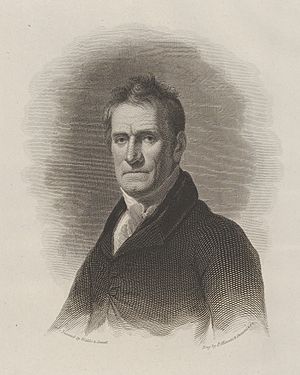Cadwallader D. Colden facts for kids
Quick facts for kids
Cadwallader D. Colden
|
|
|---|---|
 |
|
| New York State Senate (1st District) | |
| In office 1825–1827 |
|
| Member of the U.S. House of Representatives from New York's 1st district |
|
| In office December 12, 1821 – March 3, 1823 |
|
| Preceded by | James Guyon, Jr. |
| Succeeded by | Silas Wood |
| 54th Mayor of New York City | |
| In office 1818–1821 |
|
| Governor | DeWitt Clinton |
| Preceded by | Jacob Radcliff |
| Succeeded by | Stephen Allen |
| New York State Assembly | |
| In office 1818 |
|
| District attorney (1st District) | |
| In office 1810–1811 |
|
| Personal details | |
| Born |
Cadwallader David Colden
April 4, 1769 Flushing, Province of New York, British America |
| Died | February 7, 1834 (aged 64) Jersey City, New Jersey, U.S. |
| Political party | Federalist |
| Spouses |
Maria Provoost
(m. 1793; |
| Relations | Cadwallader Colden (grandfather) |
| Parents | David Colden Ann Alice Willett |
Cadwallader David Colden (born April 4, 1769 – died February 7, 1834) was an important American politician. He served as the 54th Mayor of New York City. He was also a U.S. Representative for New York.
Contents
Early Life and Education
Cadwallader David Colden was born on April 4, 1769. His family home was called Spring Hill in Flushing, New York. His parents were David Colden and Ann Alice Colden.
His grandfather was Cadwallader Colden. He was a colonial governor of New York. Young Cadwallader was taught by a private tutor. He also received a classical education in Jamaica, New York and in London. In 1785, he returned to the United States. He then studied law and became a lawyer in 1791.
Political and Public Service Career
Colden started his law career in New York City. In 1793, he moved to Poughkeepsie. He returned to New York City in 1796. From 1798 to 1801, he was an Assistant Attorney General. This role covered several counties around New York City. Later, from 1810 to 1811, he became the District Attorney for the same region.
Colden was also a Freemason. He held a high position in the Grand Lodge of New York. He was the Senior Grand Warden for many years.
War of 1812 and Abolition Efforts
During the War of 1812, Colden served as a Colonel of Volunteers. He also became a leader in the fight against slavery. In 1815, he became president of the New York Manumission Society. This group worked to end slavery in New York State.
He helped rebuild the African Free School in New York City. This school provided education for African American children. Colden and other leaders worked hard to influence lawmakers. Their efforts helped New York abolish slavery on July 4, 1827.
Key Political Roles
Colden was a member of the New York State Assembly in 1818. He then became the 54th Mayor of New York City. He served as mayor from 1818 to 1821. Governor DeWitt Clinton appointed him to this important role.
He also served in the 17th United States Congress. He was a U.S. Representative from New York from 1821 to 1823. Later, he was a member of the New York State Senate. He represented the 1st District from 1825 to 1827. After this, he moved to Jersey City, New Jersey. There, he focused on completing the Morris Canal.
Writing About Canals
Cadwallader Colden believed in building canals across the country. In 1825, New York City asked him to write a book. It was about the construction of the Erie Canal. His book, Memoir, described the canal's building. It also highlighted the "Grand Canal Celebration" in New York City. The book included pictures of the canal's construction.
Personal Life
On April 8, 1793, Cadwallader Colden married Maria Provoost. Her father was Samuel Provoost, the first Bishop of New York. They had a son named David Cadwallader Colden.
Cadwallader Colden passed away in Jersey City in 1834. He was buried in Trinity Church Cemetery in New York City.
 | Frances Mary Albrier |
 | Whitney Young |
 | Muhammad Ali |

